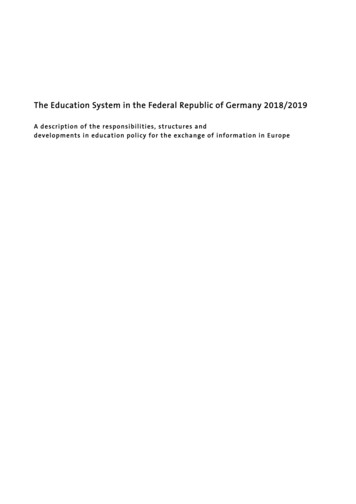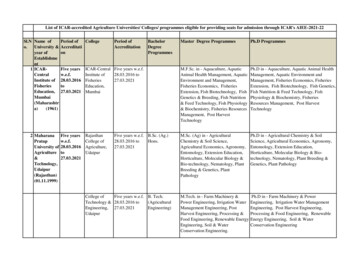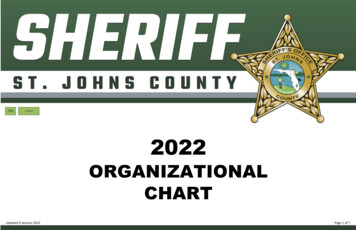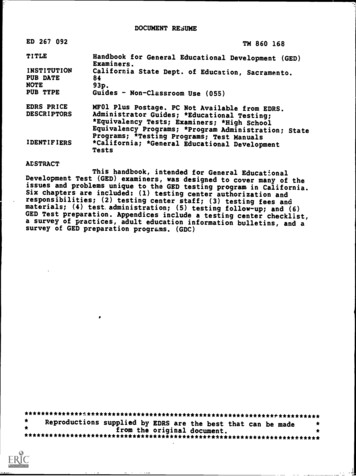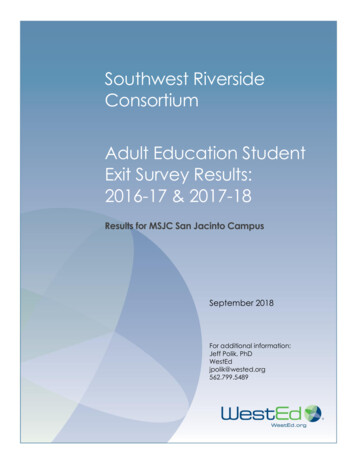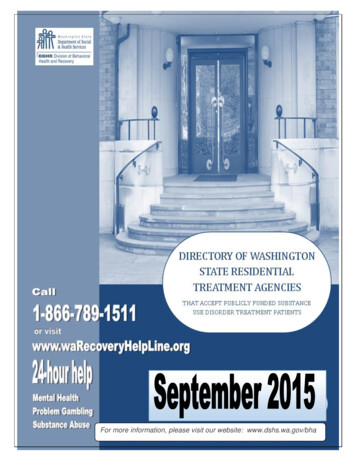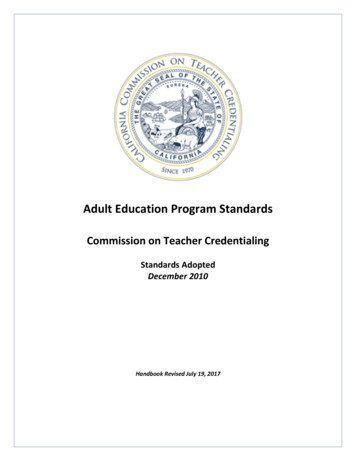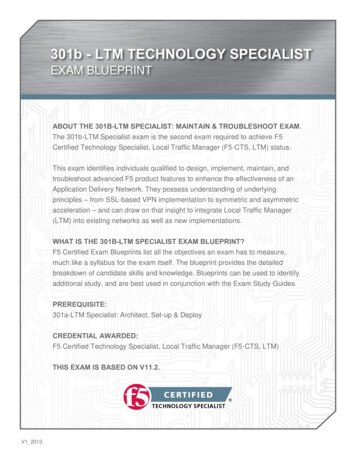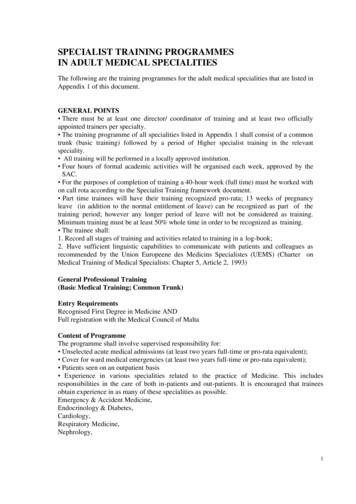
Transcription
SPECIALIST TRAINING PROGRAMMESIN ADULT MEDICAL SPECIALITIESThe following are the training programmes for the adult medical specialities that are listed inAppendix 1 of this document.GENERAL POINTS There must be at least one director/ coordinator of training and at least two officiallyappointed trainers per specialty. The training programme of all specialities listed in Appendix 1 shall consist of a commontrunk (basic training) followed by a period of Higher specialist training in the relevantspeciality. All training will be performed in a locally approved institution. Four hours of formal academic activities will be organised each week, approved by theSAC. For the purposes of completion of training a 40-hour week (full time) must be worked withon call rota according to the Specialist Training framework document. Part time trainees will have their training recognized pro-rata; 13 weeks of pregnancyleave (in addition to the normal entitlement of leave) can be recognized as part of thetraining period; however any longer period of leave will not be considered as training.Minimum training must be at least 50% whole time in order to be recognized as training. The trainee shall:1. Record all stages of training and activities related to training in a log-book;2. Have sufficient linguistic capabilities to communicate with patients and colleagues asrecommended by the Union Europeene des Medicins Specialistes (UEMS) (Charter onMedical Training of Medical Specialists: Chapter 5, Article 2, 1993)General Professional Training(Basic Medical Training; Common Trunk)Entry RequirementsRecognised First Degree in Medicine ANDFull registration with the Medical Council of MaltaContent of ProgrammeThe programme shall involve supervised responsibility for: Unselected acute medical admissions (at least two years full-time or pro-rata equivalent); Cover for ward medical emergencies (at least two years full-time or pro-rata equivalent); Patients seen on an outpatient basis Experience in various specialities related to the practice of Medicine. This includesresponsibilities in the care of both in-patients and out-patients. It is encouraged that traineesobtain experience in as many of these specialities as possible.Emergency & Accident Medicine,Endocrinology & Diabetes,Cardiology,Respiratory Medicine,Nephrology,1
Gastroenterology,Neurology,Rheumatology,Infectious Diseases,Dermatology,Geriatrics andClinical Haematology.This must include experience in at least 4 of the above-mentioned specialities of at least 3months each. For this reason the trainee must rotate between the various specialities every 3-6months.For the purposes of the previous clause, a full time rotation at Medical Admissions Unit in anapproved hospital, will also be recognized, as equivalent to one of the minimum specialities.LanguageTrainees shall have sufficient linguistic capabilities to communicate with patients andcolleagues as recommended by the Union Europeene des Medicins Specialistes (UEMS)(Charter on Medical Training of Medical Specialists: Chapter 5, Article 2, 1993).Duration & Completion of General Professional TrainingThis must not be of less than TWO YEARS full-time or pro-rata equivalent AND the traineemust obtain one of the following qualifications as evidence of completion of training: MRCP (UK) MRCPI FRACP Part 1 FRCP Canada Any other equivalent qualification approved by the Specialist Accreditation Committee afterconsultation with the Association of Physicians of Malta.Training CentreTraining shall take place in a recognised teaching centre. This must have access to a full rangeof laboratory and imaging investigations and fulfill other conditions that the SpecialistAccreditation Committee may, from time to time, determine.A Certificate of Completion of Basic Specialist Training shall be awarded if ALL the followingcriteria have been fulfilled. The trainee has undergone training of a minimum of TWO YEARS full-time or prorata equivalent in recognized specialities mentioned above. The trainee has undergone training of not less than 3 months in at least 4 recognizedspecialities mentioned above. The trainee has attained one of the following qualifications: MRCP (UK), MRCPI,FRACP Part 1, FRCP Canada, Any other equivalent qualification approved by theSpecialist Accreditation Committee after consultation with the Association ofPhysicians of Malta. The trainee has out-of-office hours experience (duties) totaling at least 44 duties. The trainee has satisfactory consultant appraisals.2
HIGHER MEDICAL TRAININGCOMMON PRINCIPLES & CONDITIONS(These apply to all specialities in Appendix 1) Trainees shall be involved in the care of ambulatory patients and of inpatients (includingmanagement of emergencies); Trainees perform an adequate number of procedures of sufficient diversity as recommendedby the UEMS; The definition of full time work and conditions pertaining to part-time work are the same asfor the common trunk. Trainees be exposed to at least two trainers, who shall be fully accredited in the relevantspeciality and one of whom shall be practicing as a specialist for at least 5 years; The director of training and respective trainers shall see that during this period the traineegets adequate experience as in this document. Trainers shall provide yearly reports to the co-coordinator of training on the progress of thetrainee, indicating possible areas where the trainee may benefit. Trainees shall have sufficient linguistic capabilities to communicate with patients andcolleagues as recommended by the Union Europeene des Medicins Specialistes (UEMS)(Charter on Medical Training of Medical Specialists: Chapter 5, Article 2, 1993). The trainee shall participate in the departmental academic activities including those of othersubspecialities. A minimum of 4 hours per week protected time is envisaged. The trainee should acquire competence in practising independently in the full breadth of thespeciality and in performing the procedures listed in the relevant speciality Research and publications are strongly encouraged. The trainee should have performed aminimum of 2 audits and have at least one publication. Participation in and scientific contribution at national and international meetings are stronglyencouraged. The trainee should have out-of-office hours experience (duties) totaling at least 22 duties peryear. At least 44 duties should be performed in the final 2 years of higher specialist training. Training shall take place in a recognised teaching institution or group of institutions whichtogether offer the trainee practice in the full range of the speciality and an opportunity forinterspecialty consultation. They must have access to a full range of laboratory and imaginginvestigations and fulfil other criteria that the Association of Physicians may, from time totime, determine. A period of overseas training of up to a maximum of two years in a recognized institutionshall be recognised provided that such a rotation must be approved by the Association ofPhysicians and that the trainee must submit a certified logbook of the training he hasundertaken at that institution. A local CCST will only be awarded if:a) The bulk of training is undertaken in a recognized institution within the territory of theRepublic of Malta ANDb) All the criteria of the local training programme are satisfied ANDc) The trainee will be required to complete the last 6 months of his training in a recognizedinstitution within the territory of the Republic of Malta. Progression through the higher specialist training (HST1 thorough to HST4) is dependenton satisfactory appraisal Training shall conform to all other requirements as laid down by the Association ofPhysicians of Malta following the broad outlines of the UEMS.3
Dual Certification Trainees working with consultants who have unrestricted acute Medical Take, and whoaccept general medical patients on their wards, and have general medical outpatients areentitled to dual certification in Internal Medicine and the other speciality being practiced. Dual certification requires the fulfillment of experience and competence requirements of bothInternal Medicine, and the higher specialist training requirements of the speciality. A certificate of completion of training in internal medicine may be issued after 3 years of“DUAL” higher specialist training.Certification in Resuscitation.Certification of having passed a short course such as ALS or equivalent is required for allmedical specialities.Knowledge-Based AssessmentFor award of CCST in any of the medical specialties after 31st December 2012, the traineeshall be in possession of specialty certificate awarded the Federation of Royal Colleges of theUK and the relevant speciality society or the UEMS speciality certificate OR an equivalentqualification recognized by the Association of Physicians of Malta.Definition of Training activitiesPlease refer to the document labeledAppendix II4
CARDIOLOGYEntry RequirementsCompletion of General Professional Training (see above)Full registration with the Medical Council of MaltaContent of ProgrammeThe duration of the training shall be 4 years during which time the trainee shall be involved inthe: The care of acute coronary patients The care of ambulatory cardiac patients referred from primary care physicians as well asfrom other specialities The interpretation of at least 1000 ECG’s Reading of at least 200 Holter ECG’s Supervision and interpretation of at least 500 exercise stress tests Performing at least 400 transthoracic echocardiograms (including colour doppler) Performing at least 50 transoesophageal echocardiograms Pacemaker programming (at least 200) Gained experience in coronary angiography & ventriculography (at least 300), right & leftcardiac catherisation studies (at least 100) and preferably in at least 50 invasiveelectrophysiological studies. Research and publications are to be encouraged Gained experience in at least 50 coronary angioplasties with or without stent insertion Gained experience in at least 20 other cardiac procedures such as closure of ventricularshuntsTraining CentreTraining shall take place in an institution or group of institutions which together offer thetrainee practice in the full range of the speciality and an opportunity for interspecialtyconsultation (in particular cardiac surgery and other medical specialities). They must include asuitably equipped coronary care and intensive care units. They must have access to a full rangeof laboratory and imaging investigations and fulfil other criteria that the Association ofPhysicians may, from time to time, determine.Duration of Higher Medical TrainingThis shall not be less than four years full-time or equivalent.(Please refer to the detailed training programme in Cardiology published by the SAC in a separatedocument)5
DERMATOLOGY & VENEREOLOGYEntry RequirementsCompletion of General Professional Training (see above)Full registration with the Medical Council of MaltaContent of ProgrammeThe duration of the training shall be 4 years during which time the trainee must acquireexperience: The management of patients suffering from dermatological and sexually transmitted diseaseson both an in-patient and out-patient basis; Diagnosis and management of bacterial, viral and fungal infections and of infestations of theskin Contact, occupational and environmental dermatology; Diagnosis and management of benign and malignant tumours of the skin; Photo dermatology; Aesthetic dermatology; Paediatric dermatology; Dermatological formulation and prescribing with topical and systemic treatments; Dermatological surgery, electro surgery, cryotherapy, phototherapy and laser treatments; Immunotherapy; Dermatological manifestations of systemic disease; Genital dermatosis; Epidemiology, diagnosis and management of sexually transmitted diseases, including HIVinfections; Prevention of sexually transmitted diseases (including partner notification), sexual health andeducation; Psychological and social aspects of dermatological and sexually transmitted diseasesTraining CentreTraining shall take place in an institution or group of institutions which together offer thetrainee practice in the full range of the speciality and an opportunity for interspecialtyconsultation (in particular plastic surgery and oncology). They must have in-patients beds forthe treatment of patients dermatological and/or sexually transmitted diseases. They must haveaccess to a full range of histopathological and microbiological investigations and fulfil othercriteria that the Association of Physicians may, from time to time, determine.Duration of Higher Medical TrainingThis shall not be less than four years full-time or equivalent.6
DIABETES & ENDOCRINOLOGYEntry RequirementsCompletion of General Professional Training (see above)Full registration with the Medical Council of MaltaContent of ProgrammeThe duration of the training shall be 4 years during which time the trainee shall: Be involved in the Care of Acute Medical Admissions Be involved in the Care of Acute Endocrinological Emergencies Be involved in the Care of ambulatory patients with endocrinological disease Be involved in the Care of patients with lipid and other metabolic disorders Participate in Diabetes Education Programmes Acquire competence in Endocrinological/Diabetological Review of patients in otherdepartments (including obstetric and surgical patients). Participate in diabetes foot care in conjunction with chiropodist, vascular and orthopaedicsurgeons and orthotics specialists. Acquire competence and knowledge with regard to the indications, supervision andinterpretation of dynamic endocrinological tests Participate in all other aspects of ambulatory diabetes care (of both major types of diabetes)Training CentreTraining shall take place in an institution or group of institutions which together offer thetrainee practice in the full range of the speciality and an opportunity for interspecialityconsultation (in particular nephrology, ophthalmology, vascular surgery, cardiology and othermedical specialities). They must include surgical and obstetric care. They must have access toa full range of laboratory (including endocrinological assays) and imaging investigations andfulfill other criteria that the Association of Physicians may, from time to time, determine.Duration of Higher Medical TrainingThis shall not be less than four years full-time or equivalent.7
GASTROENTEROLOGYEntry RequirementsCompletion of General Professional Training (see above)Full registration with the Medical Council of MaltaContent of ProgrammeThe duration of the training shall be 4 years during which time: The trainee must be involved in the care of Acute Medical Admissions. The trainee must gain experience in all aspects of medical (non-surgical) care of ambulatoryand in-patient care of patients suffering from diseases of the gastro-intestinal tract, the liverand pancreas. The trainee must perform at least 300 oesophageal-gastro-duodenoscopies, at least 30 sclerotherapy procedures for oesophageal varices, at least 100 colonoscopies, at least 50 colonoscopic polypectomy and related procedures Experience in ERCP, manometric and pH investigation and therapeutic endoscopy isencouragedTraining CentreTraining shall take place in an institution or group of institutions which together offer thetrainee practice in the full range of the speciality and an opportunity for interspecialtyconsultation. They must include other associated specialities especially other medicalspecialities and gastrointestinal surgery. They must have access to a full range of laboratoryand imaging investigations and fulfil other criteria that the Association of Physicians may,from time to time, determine.Duration of Higher Medical TrainingThis shall not be less than four years full-time or equivalent.8
GENERAL (INTERNAL) MEDICINEEntry RequirementsCompletion of General Professional Training (see above)Full registration with the Medical Council of MaltaContent of ProgrammeThe programme shall involve supervised responsibility for: Unselected acute medical admissions Cover for ward medical emergencies Care of patients in a Medical outpatient setting Experience in all the following specialities related to the practice of Medicine: Emergency& Accident Medicine, Diabetes & Endocrinology, Cardiology, Respiratory Medicine,Nephrology, Gastroenterology, Neurology, Rheumatology, InfectiousDiseases,Dermatology and Geriatrics). This includes responsibilities in the care of both in-patientsand out-patients. Rotation in different specialities is recommended for trainees only seeking certification inInternal Medicine.Dual Certification Trainees working with consultants who have unrestricted acute Medical Take, and whoaccept general medical patients on their wards, and have general medical outpatientsare entitled to dual certification in Internal Medicine and the other speciality beingpracticed. Dual certification requires the fulfillment of experience and competence requirementsof both Internal Medicine, and the requirements of the speciality of higher specialisttraining. A certificate of completion of train in internal medicine may be issued after 3 years ofhigher specialist training – (Trainer having dual practice – Acute Medical andSpeciality)Training CentreTraining shall take place in an institution or group of institutions which together offer thetrainee practice in the full range of the speciality and an opportunity for interspecialtyconsultation. They must include other associated specialities including surgical and othermedical specialities. They must also have a suitably equipped coronary care and intensive careunits. They must have access to a full range of laboratory and imaging investigations and fulfilother criteria that the Association of Physicians may, from time to time, determine.Duration of Higher Medical TrainingThis shall not be less than THREE years full-time or equivalent.9
GERIATRICSEntry RequirementsCompletion of General Professional Training (Common Trunk)Full registration with the Medical Council of MaltaContent of Programme The main objective of the programme is to enable trainees to acquire the diagnostic,therapeutic and rehabilitative clinical skills necessary to practice the specialty ofgeriatrics.The programme shall mainly involve supervised responsibility for the assessment andmanagement of ill older persons presenting with medical geriatric problems includingacute situations and chronic disabling conditions.The trainee must acquire knowledge on the complex interrelationship of medical,functional, social and psychological problems characteristic of illness and disabilitiesin older persons and develop the necessary skills to carry out comprehensive geriatricassessments with appropriate care management plans.The trainee must gain competence in the rehabilitation of older persons suffering frommedical, surgical or orthopaedic conditions and must develop the necessary skills ofworking within an interdisciplinary team environment which will include effectivecommunication and discharge planning.The trainee must obtain clinical experience in inpatients, outpatients, day hospital andchronic care settings and must acquire the competence to deal with arising medicalsituations including ward emergencies.The trainee must gain competence in inter-specialty consultation and develop thenecessary skills to deal with patient referrals including those for rehabilitationprogrammes and chronic care institutionalization.Besides acquiring clinical practice skills, the trainee must also obtain experience incarrying out research and audit projects relevant to the specialty of geriatrics.Training CentreTraining shall take place in an institution or group of institutions which together offer thetrainee practice in the full range of the speciality and an opportunity for interspecialityconsultation. They must include other associated specialities including surgical, orthopaedicand other medical specialities. They must also have facilities for interdisciplinary teampractice (the team should include physiotherapists, occupational therapists, speech therapists,social workers and pharmacists). They must have access to a full range of laboratory andimaging investigations and fulfill other criteria that the Association of Physicians, incollaboration with the Geriatric Medicine Society of Malta may, from time to time, determine.Duration of Higher Medical TrainingThis shall not be less than four years full-time or equivalent(Please refer to the detailed training programme in Geriatrics published by the SAC in a separatedocument)10
INFECTIOUS DISEASESEntry RequirementsCompletion of General Professional Training (see above)Full registration with the Medical Council of MaltaContent of ProgrammeThe trainee must gain experience and knowledge in the epidemiology, prevention, diagnosis,treatment and complications of as wide a variety of communicable diseases as possible. Thismust include tuberculosis, infections with atypical mycobacteriae, HIV infections, infections inthe immunocompromised host and nosocomial infections.Training CentreTraining shall take place in an institution or group of institutions which together offer thetrainee practice in the full range of the speciality. They must have an intensive care unit andother specialities must also be represented (particularly other medical specialities and surgery)so as to provide an opportunity for interspecialty consultation. They must have access to a fullrange of microbiological, biochemical, haematological and imaging investigations and fulfilother criteria that the Association of Physicians may, from time to time, determine.Duration of Higher Medical TrainingThis shall not be less than four years full-time or equivalent.11
NEPHROLOGYEntry RequirementsCompletion of General Professional Training (see above)Full registration with the Medical Council of MaltaContent of Programme The programme shall involve supervised responsibility for the care of patients with renaldisease on both an inpatient and ambulatory basis. The trainee must gain experience in the management of acute renal failure, chronic renalfailure, fluid and electrolyte disorders, hypertension, renal disease secondary to systemicdisease such as hypertension, diabetes and connective tissue diseases, infections of the renaltract, nephrolithiasis and hereditary and congenital renal disease. The trainee shall acquire knowledge of nutritional aspects of renal disease The trainee must also acquire expertise in the interpretation of biochemical, immunologicaland haematological investigations relevant to renal disease The trainee must acquire expertise in peritoneal dialysis and haemodialysis, including theirindications, practical aspects of the procedures and management of complications. The trainee must become conversant with the indications for live and cadaveric renaltransplantation, recognition and management of short-term and long-term complications oftransplantation, evaluation of potential live and cadaveric renal transplant donors and theprinciples of organ harvesting, preservation and storage. The trainee must acquire competence in the performance of renal biopsy as well as in itsindications and recognition and management of its complications.Note A period of training of 3-6 months in a centre with a high turnover for renal transplantationis highly recommendedTraining CentreTraining shall take place in an institution or group of institutions which together offer thetrainee practice in the full range of the speciality and an opportunity for interspecialtyconsultation (particularly renal transplant and vascular surgery and other medical specialities).They must also have an intensive care unit. They must have access to a full range of laboratoryand imaging (including ultrasound, CT, radionuclear investigations and angiography)investigations and fulfil other criteria that the Association of Physicians may, from time totime, determine.Duration of Higher Medical TrainingThis shall not be less than four years full-time or equivalent.12
NEUROLOGYEntry RequirementsCompletion of General Professional Training (see above)Full registration with the Medical Council of MaltaContent of ProgrammeThe programme shall involve supervised responsibility for the care of patients with neurologicaldisease on both an inpatient and ambulatory basis.This shall include neurovascular disease, neurodegenerative disease, infections of the nervous system, inherited and congenital diseases, demyelinating disease, alcohol-related and nutritional neurological disease, extrapyramidal disorders, epilepsies, diseases of the peripheral nervous system, neuromuscular disorders and neoplasms of the nervous system. The trainee must acquire competence in the interpretation of commonly used radiologicalprocedures (including CT and MRI) and neurophyiological studies (EEG, nerve conductionstudies, EMG). The trainee shall perform at least 50 lumbar punctures.Training CentreTraining shall take place in an institution or group of institutions which together offer thetrainee practice in the full range of the speciality and an opportunity for interspecialtyconsultation (particularly neurosugery and other medical specialities). They must also have anintensive care unit. They must have access to a full range of laboratory and imaging (includingultrasound, CT, radionuclear investigations and angiography) investigations and fulfil othercriteria that the Association of Physicians may, from time to time, determine.Duration of Higher Medical TrainingThis shall not be less than four years full-time or equivalent.13
ONCOLOGY AND RADIOTHERAPYEntry RequirementsCompletion of General Professional Training (see above)Full registration with the Medical Council of MaltaGENERAL PRINCIPLES AND CONDITIONS1. The programme shall involve supervised responsibility for the care of patients with solidmalignant disease on both an inpatient and ambulatory basis2. The trainee will complete 5 years training programme, full time equivalent and achieve theFellowship of the Royal College of Radiologists (FRCR) examination or equivalent3. Training shall take place in at least 2 recognised teaching institutions, which together offerthe trainee practice in the full range of the speciality and an opportunity for inter-specialtyconsultation4. Progression through the higher specialist training (HST1 thorough to HST5) is dependenton satisfactory appraisal5. The trainee must obtain experience in the use of radiotherapy and systemic agents, bothchemotherapy and immunotherapy, in the treatment of solid malignant disease6. The trainee must acquire competencies in the diagnosis and management of thecomplications of systemic treatment and radiotherapy, including oncological emergencies7. The trainee may spend up to a maximum of 2 years of his/her training in a recognisedforeign institution, provided that such a rotation is approved by the Association ofPhysicians and that the trainee submits a certified logbook of the training he/she hasundertaken at that institution8. Research and Publications are strongly encouraged. The trainee should have performed aminimum of 3 Audit or Quality Improvement Projects9. Participation in and scientific contribution at national and international meetings is stronglyencouraged10. Trainees are exposed to at least 2 trainers, who shall be fully accredited in the relevantspeciality and one of whom shall be practicing as a specialist for at least 5 years11. The director of training and respective trainers shall see that during this period the traineereceives adequate experience as in this document12. Trainers shall provide yearly reports to the co-coordinator of training on the progress of thetrainee, indicating possible areas where the trainee may benefit13. Trainees shall have sufficient linguistic capabilities to communicate with patients andcolleagues as recommended by the Union Europeene des Medicins Specialistes (UEMS)(Charter on Medical Training of Medical Specialists: Chapter 5, Article 2, 1993)14. The trainee has out-of-office hours experience (duties) totaling at least 22 duties per year.At least 44 duties should be performed in the final 2 years of higher specialist training(Please refer to the detailed training programme in Clinical Oncology published by the SAC in aseparate document)14
RESPIRATORY MEDICINEEntry RequirementsCompletion of General Professional Training (see above)Full registration with the Medical Council of MaltaContent of Programme The programme shall involve supervised responsibility for the care of patients with acute andwith chronic pulmonary disease on both an inpatient and ambulatory basis. This must include experience of the management of obstructive pulmonary diseases,allergic lung diseases, interstitial lung diseases, malignant disease of the lung, pleura and mediastinum, pulmonary infections (including pulmonary and extra-pulmonary tuberculosis), pulmonarylung disease, occupational and environmental pulmonary disease and sleep disorders. The trainee must acquire the skills and competence to interpret pulmonary function testsincluding spirometry, flow volume studies, diffusion capacity, airways resistance andarterial blood gas analysis. The trainee must acquire the skills and competence to perform thoracocentesis, insertion of intercostal drains, flexible fibreoptic bronchoscopy. The trainee must acquire the skills and competence in the provision of ventilatory supportTraining CentreTraining shall take place in an institution or group of institutions which together offer thetrainee practice in the full range of the speciality and an opportunity for interspecialtyconsultation (particularly cardiothoracic surgery,
Republic of Malta AND b) All the criteria of the local training programme are satisfied AND c) The trainee will be required to complete the last 6 months of his training in a recognized institution within the territory of the Republic of Malta. Progression through the higher specialist training (HST1 thorough to HST4) is dependent
